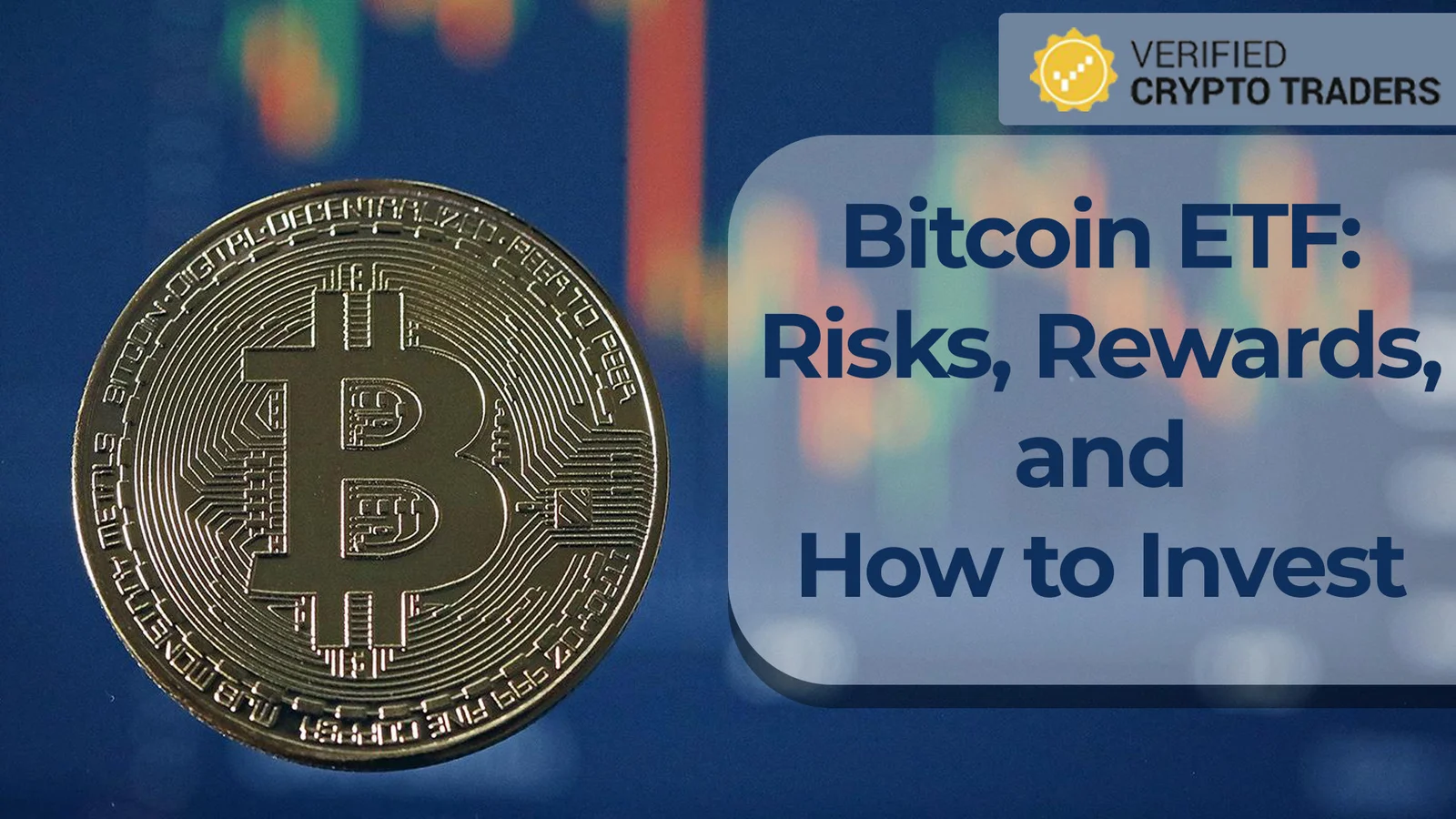
Table of Contents
Introduction
Bitcoin, the world’s first and most well-known cryptocurrency, has seen a tremendous surge in popularity in recent years. With more and more people looking to invest in Bitcoin, various investment options have emerged, including Bitcoin ETF.
In this article, we will explore everything you need to know about Bitcoin ETF. We will discuss what Bitcoin ETF is, how it works, and the benefits and drawbacks of investing in it. We will also compare and contrast Bitcoin ETF with other investment options, such as Bitcoin futures, mutual funds, and stocks, and discuss the potential risks and rewards of investing in Bitcoin ETF.
Whether you’re a seasoned investor or just starting out, this article will provide you with a comprehensive guide to Bitcoin ETF and help you make an informed decision about investing in it. So, let’s dive in and explore the world of Bitcoin ETF!
What is the Bitcoin ETF?
Bitcoin ETF, or Bitcoin exchange-traded fund, is a type of investment fund that tracks the performance of Bitcoin. It works in a similar way to other exchange-traded funds, such as those that track the performance of stocks, commodities, or other assets.
The following are essential considerations regarding Bitcoin ETFs:
- Bitcoin ETF allows investors to gain exposure to Bitcoin without actually buying and storing Bitcoin themselves. Instead, investors can buy shares of the ETF, which in turn holds Bitcoin as the underlying asset.
- Bitcoin ETF is designed to track the price of Bitcoin, so as the price of Bitcoin goes up or down, so does the value of the ETF shares.
- Bitcoin ETF can be traded on major stock exchanges, which means that investors can buy and sell shares of the ETF just like they would with any other stock.
- Bitcoin ETF is regulated by government agencies, which can provide investors with some level of protection and oversight.
- Bitcoin ETFs can come in different forms, including physically-backed ETFs, futures-based ETFs, and synthetic ETFs. Each type has its own set of advantages and disadvantages, depending on an investor’s preferences and risk appetite.
Also, read- Technical analysis vs. Fundamental analysis: what’s the difference?
Bitcoin ETF Investing Guide
Investing in Bitcoin ETF can be a straightforward and accessible way to gain exposure to Bitcoin. Here are some key points to keep in mind when it comes to investing in Bitcoin ETF:
- First, you need to choose a brokerage platform that offers Bitcoin ETF. Some popular options include Coinbase, Robinhood, and SoFi Invest, among others. Make sure to compare the fees, features, and security measures of each platform before making a decision.
- Once you have chosen a platform, you must open and fund an account. This usually involves providing some personal and financial information, such as your name, address, and bank account details. Make sure to follow the platform’s instructions carefully and securely.
- After your account is funded, you can search for Bitcoin ETF on the platform and buy shares of the ETF. You can buy as many or as few shares as you want, depending on your investment goals and budget.
- When you buy shares of Bitcoin ETF, you are essentially buying a claim to a portion of the underlying Bitcoin held by the ETF. As the value of Bitcoin goes up or down, so does the value of your shares.
- You can hold your shares of Bitcoin ETF for as long as you want, or sell them at any time. Keep in mind that buying and selling shares of Bitcoin ETF may involve transaction fees and taxes, so make sure to factor those into your investment strategy.
Also, read- The guide for new traders: should you trade alone or in a group?
Investing in Bitcoin ETFs vs. other options
Bitcoin ETF is not the only way to invest in Bitcoin or cryptocurrency. Here are some other investment options that you may want to consider, along with their key features and differences compared to Bitcoin ETF:
- Bitcoin futures: Bitcoin futures allow investors to bet on the future price of Bitcoin without actually buying and holding Bitcoin. Futures contracts are agreements to buy or sell Bitcoin at a specific price and date in the future. Bitcoin futures are traded on futures exchanges, and the prices are determined by supply and demand. Futures trading can be more complex and risky than ETF trading and may require more experience and knowledge.
- Mutual funds: Mutual funds are pools of money from multiple investors that are managed by professional fund managers. Some mutual funds invest in Bitcoin or cryptocurrency, either directly or indirectly through companies that are involved in the cryptocurrency industry. Mutual funds can provide diversification and professional management, but may also come with higher fees and less transparency compared to ETFs.
- Stocks: Some publicly-traded companies, such as MicroStrategy and Square, have invested in Bitcoin as part of their corporate treasury strategy. Buying stocks of these companies can provide exposure to Bitcoin indirectly, although the correlation between the stock price and Bitcoin price may not be perfect. Stores can also provide dividends and other benefits but may be affected by other factors beyond Bitcoin’s performance.
- Physical Bitcoin: Buying and holding physical Bitcoin, such as through a cryptocurrency exchange or wallet, can provide direct ownership and control over the asset. However, it also comes with the risks of security, regulation, and volatility that are inherent in the cryptocurrency market.
Also read- Bitcoin and altcoins: what’s the difference?
Investing in Bitcoin ETFs: Potential Rewards and Risks
Investing in Bitcoin ETFs can come with both potential risks and rewards. Here are some key factors to consider before investing in Bitcoin ETF:
Potential Risks:
Potential Rewards:
- Exposure to Bitcoin: Bitcoin ETF provides a convenient and accessible way to gain exposure to the potential benefits of Bitcoin, such as its decentralized nature, its scarcity, and its potential as a store of value and hedge against inflation.
- Diversification: Bitcoin ETF can be part of a diversified investment portfolio, alongside other asset classes, such as stocks, bonds, and commodities. This can help to spread the risk and reduce the volatility of the portfolio.
- Regulation and transparency: Bitcoin ETF is subject to regulation by securities regulators, such as the SEC in the United States, which can provide a higher level of oversight and transparency compared to other cryptocurrency investment options.
- Accessibility: Bitcoin ETFs can be bought and sold on regulated stock exchanges, which can make it easier and more convenient for investors to access the cryptocurrency market, especially those who are not familiar with the technical aspects of buying and holding Bitcoin.
Also read- Bitmex margin trading: how it works and risks involved
Conclusion
In conclusion, Bitcoin ETF is a relatively new and innovative investment product that provides a convenient and regulated way to invest in Bitcoin. While Bitcoin ETF can offer benefits such as exposure to Bitcoin, diversification, and accessibility, it also comes with potential risks such as market volatility, regulatory and legal risks, counterparty risk, and liquidity risk.
Investors who are considering investing in Bitcoin ETF should carefully evaluate their investment objectives, risk tolerance, and financial situation, and seek professional advice as needed. It’s important to remember that investing in Bitcoin ETF, or any other investment, involves risk, and past performance is not necessarily indicative of future results.
Overall, Bitcoin ETF can be a valuable addition to an investment portfolio, but it should be approached with caution and careful consideration of the potential risks and rewards. As the cryptocurrency market continues to evolve, it will be interesting to see how Bitcoin ETF and other investment products will adapt and innovate to meet the changing needs of investors.


